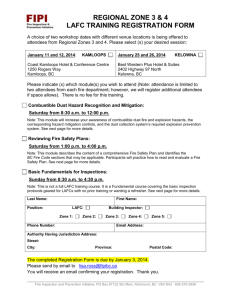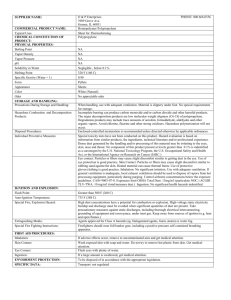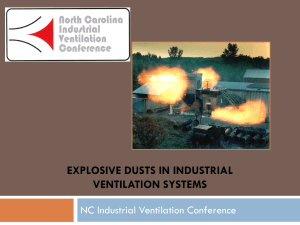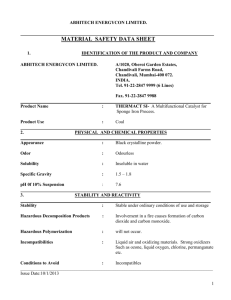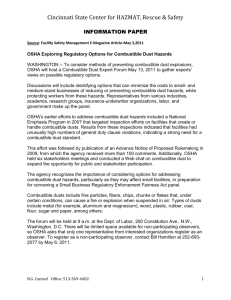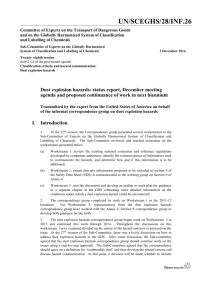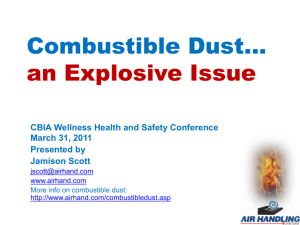ZONE 5 – LAFC Training Registration Form
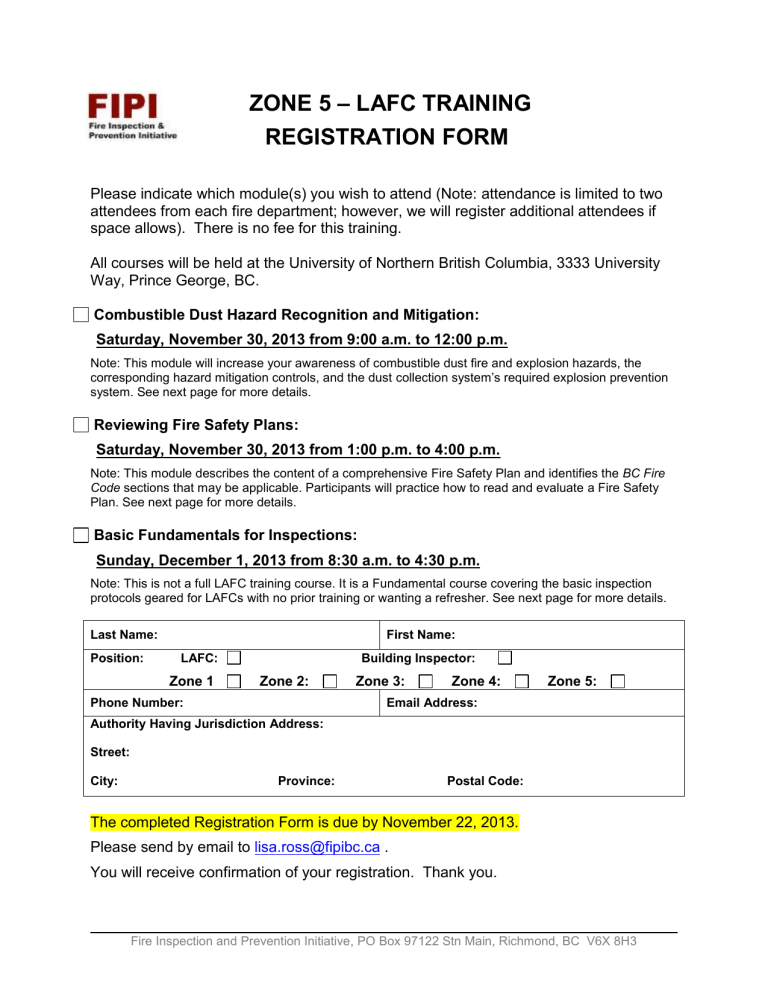
ZONE 5 – LAFC TRAINING
REGISTRATION FORM
Please indicate which module(s) you wish to attend (Note: attendance is limited to two attendees from each fire department; however, we will register additional attendees if space allows). There is no fee for this training.
All courses will be held at the University of Northern British Columbia, 3333 University
Way, Prince George, BC.
Combustible Dust Hazard Recognition and Mitigation:
Saturday, November 30, 2013 from 9:00 a.m. to 12:00 p.m.
Note: This module will increase your awareness of combustible dust fire and explosion hazards, the corresponding hazard mitigation controls, and the dust collection system’s required explosion prevention system. See next page for more details.
Reviewing Fire Safety Plans:
Saturday, November 30, 2013 from 1:00 p.m. to 4:00 p.m.
Note: This module describes the content of a comprehensive Fire Safety Plan and identifies the BC Fire
Code sections that may be applicable. Participants will practice how to read and evaluate a Fire Safety
Plan. See next page for more details.
Basic Fundamentals for Inspections:
Sunday, December 1, 2013 from 8:30 a.m. to 4:30 p.m.
Note: This is not a full LAFC training course. It is a Fundamental course covering the basic inspection protocols geared for LAFCs with no prior training or wanting a refresher. See next page for more details.
Last Name:
Position: LAFC:
First Name:
Building Inspector:
Zone 1 Zone 2: Zone 3: Zone 4: Zone 5:
Phone Number:
Authority Having Jurisdiction Address:
Email Address:
Street:
City: Province: Postal Code:
The completed Registration Form is due by November 22, 2013.
Please send by email to lisa.ross@fipibc.ca
.
You will receive confirmation of your registration. Thank you.
Fire Inspection and Prevention Initiative, PO Box 97122 Stn Main, Richmond, BC V6X 8H3
Combustible Dust Hazard Recognition and Mitigation
If there are industrial occupancies in your jurisdiction that produce or utilize combustible dust
(e.g., wood, pulp and paper, food, metals, chemical/pharmaceutical, textile) in their manufacturing activities, you need to learn (1) if the dust is combustible, (2) how a dust explosion can occur, and (3) what the building owner/occupier must do to prevent such an explosion.
Combustible dust is common in many workplaces and is known as an insidious hazard, meaning it can develop slowly over time, in plain sight or in hidden areas. At some point in time, the five basic conditions for an explosion will come together in a horrible “perfect storm” scenario with devastating consequences.
This workshop is designed to increase LAFC awareness about the dust hazard and how to reduce it. After attending this workshop, you will be able to identify a combustible dust hazard, list sources of combustible dusts and describe the conditions necessary for a dust explosion to occur.
As well, you will be able to determine if there is an explosion risk in the workplace, understand dust control mechanisms, source collection and transport from dust producing equipment and common dust collection systems and their required explosion protection.
Reviewing Fire Safety Plans
The consequences of poor fire safety practices and a lack of emergency planning are especially serious in properties where processes or quantities of stored materials could pose a serious threat, not only to the business and its employees, but also to the community and environment in the event of an emergency.
In an effort to prevent fires and minimize the damage from fires when they occur, a properly developed and implemented Fire Safety Plan (FSP) is required. For this reason, the FSP must be prepared by the owner or owner’s authorized agent in cooperation with the local fire department and other applicable regulatory authorities (e.g., WorkSafeBC and the BC Safety
Authority will review the FSP but cannot give advice).
In this module we will discuss our Fire Safety Plan process and take a close look at the key components of a comprehensive Fire Safety Plan for industrial occupancies in order to provide effectual feedback to the owner or owne r’s authorized agent
Basic Fundamentals for Inspections
The purpose of the Local Assistant to the Fire Commissioner (LAFC) Inspections module is to help support our LAFCs when conducting inspections on various businesses / industries.
The fundamental reason for conducting fire inspections is to reduce the risk of life and property losses from fire, by identifying and ensuring the correction of conditions which contribute to the occurrence and spread of fire.
The end result of a fire prevention inspection should:
provide a record of the findings and actions required as a result of the inspections;
produce a property that is safer because the inspection was conducted; and,
inspire an improved attitude towards fire prevention by management and employees.
We will discuss our roles as LAFC, review our inspections process, look at some samples of checklists we can use during inspections and talk about where we can go for support.
Fire Inspection and Prevention Initiative, PO Box 97122 Stn Main, Richmond, BC V6X 8H3
